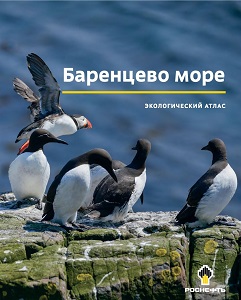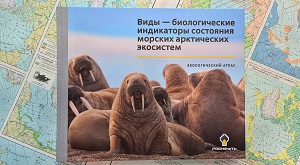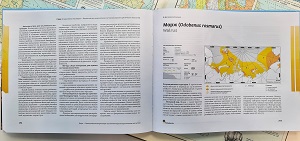Please activate JavaScript in your browser to use all interface options.
Rosneft Publishes New Environmental Atlases
28 December 2020
Rosneft Oil Company has published atlases “Barents Sea” and “Species: Biological Indicators for the State of Arctic Marine Ecosystems” as part of its Environmental Atlases of the Russian Seas series, jointly with the Innopraktika non-governmental development institute.
The Barents Sea Atlas consists of six thematic chapters and is a collection of research data on physical geography, oceanology, hydrometeorology and the environment. The publication contains detailed information on the typology of the Barents Sea coastline and provides up-to-date information on marine mammals, birds, fish, benthos and plankton. The atlas features over 55 thematic schematic maps of the waters and coastal zone of the Barents Sea, many charts, schemes, summary tables and artistic illustrations.
 It represents the results of many years of Rosneft Oil Company’s environmental monitoring and research activities at its license areas. The data collected helped update the previously known information and add to the current understanding of environmental dynamics. The publication also presents the results of specific studies on polar bear and walrus marine mammals, carried out as part of the corporate programme for the conservation of marine ecosystem biological diversity. The programme aims to ensure the protection of populations of endangered animal species, the state of which can be used to judge the overall balance of nature in the Arctic.
It represents the results of many years of Rosneft Oil Company’s environmental monitoring and research activities at its license areas. The data collected helped update the previously known information and add to the current understanding of environmental dynamics. The publication also presents the results of specific studies on polar bear and walrus marine mammals, carried out as part of the corporate programme for the conservation of marine ecosystem biological diversity. The programme aims to ensure the protection of populations of endangered animal species, the state of which can be used to judge the overall balance of nature in the Arctic.
 One of the stages in the implementation of this programme is the preparation of the atlas on the species that are biological indicators of the state of Arctic marine ecosystems. The publication describes over 60 species inhabiting the northern latitudes, presents a brief description of the seas of the Russian Arctic, summarises methods of biological indication and assesses biodiversity in Rosneft’s license areas. It contains unique artistic illustrations, maps and photographs from the Company’s expeditions.
One of the stages in the implementation of this programme is the preparation of the atlas on the species that are biological indicators of the state of Arctic marine ecosystems. The publication describes over 60 species inhabiting the northern latitudes, presents a brief description of the seas of the Russian Arctic, summarises methods of biological indication and assesses biodiversity in Rosneft’s license areas. It contains unique artistic illustrations, maps and photographs from the Company’s expeditions.
The atlas was designed by specialists from the Company’s Arctic Research Centre and the nation’s leading institutions, including the Lomonosov Moscow State University, the Shirshov Institute of Oceanology of the Russian Academy of Sciences, the Zubov State Oceanographic Institute, the Knipovich Polar Research Institute of Marine Fisheries and Oceanography, the Zoological Institute of the Russian Academy of Sciences, and the Murmansk Marine Biological Institute.
Download the Atlases free of charge:
Atlas “Barents Sea”
Atlas “Species: Biological Indicators for the State of Arctic Marine Ecosystems”
Note for Editors:
In 2019, Rosneft together with Innopraktika, a non-governmental development institute, published a unique atlas “Russian Arctic. Space, Time, Resources”. The Atlas pays great attention to the natural environment and resources of the Arctic. It details history, culture, ethnography, economics, the social sphere, infrastructure and development prospects of the polar regions.
As part of the Environmental Atlases of the Russian Seas series, Rosneft and Innopraktika have published the following atlases: “Kara Sea”, “Laptev Sea” and “Marine Mammals of the Russian Arctic and the Far East”, as well as the Environmental Atlas of the Black and Azov Seas. The series provides up-to-date knowledge in physical geography, oceanology, hydrometeorology, ecology, and marine mammals’ dispersal based on Rosneft Oil Company’s research activities in the Arctic. The Environmental Sensitivity Index (ESI) system has been adapted for the marine bank typification sections.
Rosneft
Information Division
December 28, 2020

-315xx70.png)

